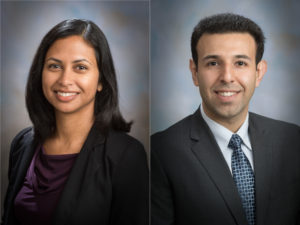Aditi Bhaskar and Mahdi Nikdast receive NSF CAREER awards
by Jayme DeLoss and Andrea Leland
April 6, 2021

Two Walter Scott, Jr. College of Engineering professors have been selected for the National Science Foundation’s most prestigious early-career faculty award. Aditi Bhaskar, assistant professor of Civil and Environmental Engineering, and Mahdi Nikdast, assistant professor of Electrical and Computer Engineering, were recognized with CAREER awards for their potential to serve as academic role models in research and education and to lead advances in their fields.
Bhaskar is connecting urban irrigation efficiency to streamflow
Bhaskar will use her CAREER funding to find out to what extent lawn irrigation contributes to streamflow in semi-arid urban watersheds and determine the effects of reduced urban irrigation.
“Reducing urban irrigation could play a critical role in achieving water security and sustainability in river basins where water is scarce,” Bhaskar stated in her proposal.
This is particularly important along the Front Range of Colorado, where water supply is lagging behind the growing demand, and the majority of water used on residential properties goes to irrigating landscapes and lawns.
We have the means to reduce urban irrigation by using efficient irrigation systems or converting lawns through xeriscaping or impervious surfaces, but we don’t know exactly how this will affect streamflow. Some fear conservation could dry out our urban streams and harm the water rights of downstream users.
Bhaskar’s project will quantify the impacts of current and more efficient irrigation practices on streamflow. The growing urban communities on the Front Range affect the agricultural communities to the east, and Bhaskar wants to better understand those connections and support conservation practices with data. Ultimately, her goal is to help semi-arid communities flourish with less water.
Communities of color are disproportionately impacted by lower drinking water quality and other environmental disservices, in part because of the underrepresentation of people of color in the water workforce. The education part of Bhaskar’s proposal addresses this disparity by working to diversify the urban water workforce to be more reflective of the communities served.
Bhaskar will work with the Colorado Water Center’s Student Fellows program to mentor students of color interested in water careers. She also will work with undergraduate students on water research and crowd-sourced stream tracking.
Additionally, Bhaskar’s CAREER award will enable development of equity-focused teaching materials for water-related undergraduate courses, in collaboration with Associate Professor Rebecca Atadero. Bhaskar and Atadero aim to incorporate more discussion on the social responsibility of engineering decisions and how civil and environmental engineering are closely tied to people.
“How can we be of service to people and make sure our decisions are not serving people differentially based on their income or race, for example,” Bhaskar said.
Nikdast is developing new technology for our data-driven society
Nikdast has been selected by the NSF to lead research on a new class of technology that could serve as an essential building block for advancing our hyper-connected world.
Whether working from home, shopping online, using GPS navigation, or connecting with friends on social media, our online activities are on the rise – and we are straining our technology infrastructure with the mind-boggling amounts of data we generate every day.
The five-year CAREER award will help Nikdast optimize and bolster network systems that process the ever-growing volume of data we produce through our high-tech gadgets and applications. His work could represent a vital step forward in supporting and accelerating emerging innovations, from self-driving cars to smart cities.
“As devices and systems become ‘smarter’ and more connected, our technological future relies on our ability to manage and move massive amounts of data,” said Tony Maciejewski, head of the Department of Electrical and Computer Engineering.
Working in collaboration with industry partners at Microsoft, NVIDIA, and CEA-Leti, a French government-funded technology research organization, Nikdast will spearhead the development and application of a new type of datacenter network switches, the tools responsible for moving data from one server to another. Leveraging the power of silicon photonics technology, Nikdast aims to develop network switches capable of processing an extremely high volume of data at the fastest possible speed without problematic delays, while improving energy efficiency.
“When it comes to high-performance computing and datacenter systems, it’s not about how fast they can compute, but how quickly and efficiently different resources within such systems can communicate,” Nikdast said. “The novel network switches designed and optimized in this project would make it easy for future networked systems to communicate efficiently.”
The CAREER award will also help Nikdast launch a new outreach program to broaden participation in computing and STEM fields, with a focus on K-12 schools in Northern Colorado and Southern Wyoming with low college-attendance rates.
“As a first-generation college student, I am passionate about sharing the excitement of engineering with underrepresented groups and helping them succeed,” Nikdast said.